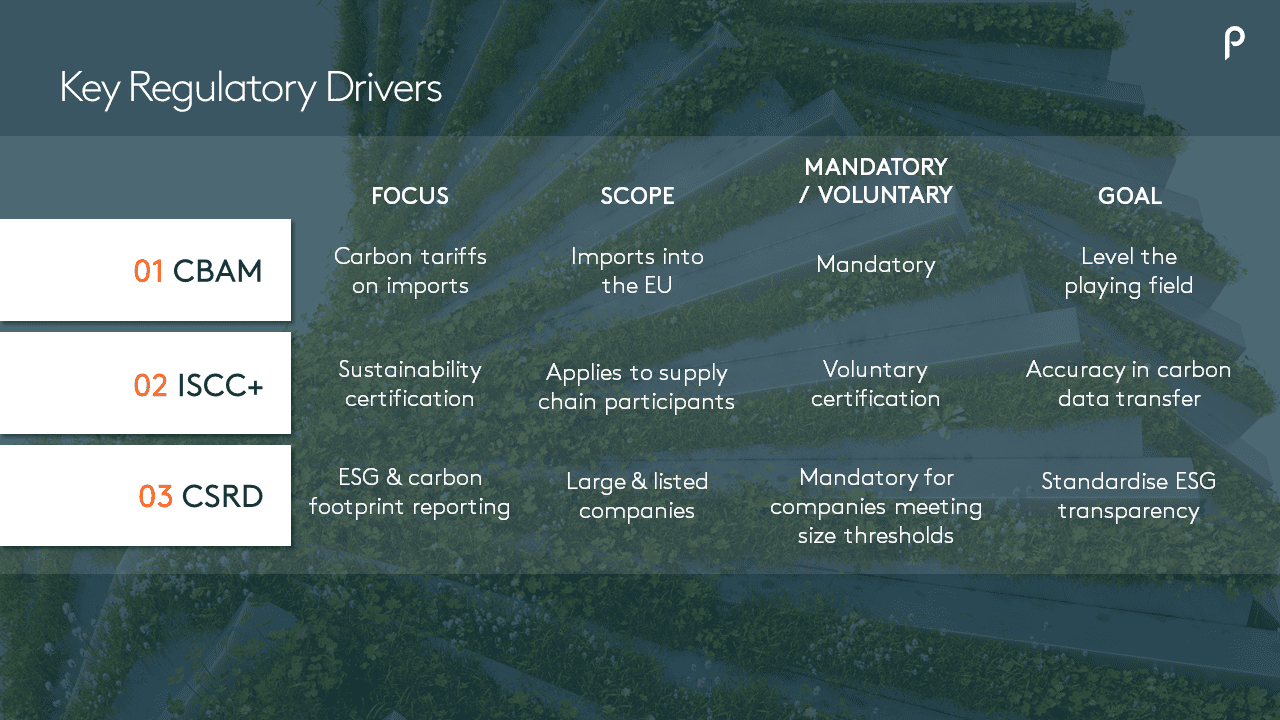I was recently invited to speak at the Chemical Business Association's conference, Sustainable Futures: Enhancing the Chemical Supply Chain.
The conference brought together supply chain professionals from across the EMEA chemicals industry to discuss sustainability initiatives.
In this article I share the insights on talent that I explored at the conference.
Key Regulations are Driving Sustainability Across the Chemicals Supply Chain
With sustainability growing in importance across the EMEA chemicals industry, it comes as no surprise that new regulations are being introduced to drive change across the supply chain. Three regulations often come up in conversations I have with supply chain leaders:
- CBAM (Carbon Border Adjustment Mechanism)
- ISCC+ (International Sustainability and Carbon Certification)
- CSRD (Corporate Sustainability Reporting Directive)
These regulations are designed to increase transparency on supply chain sustainability, improve accuracy of reporting and level the playing field by ensuring non-EU organisations achieve the same standards as EU producers.

As a result of the new regulations, we are observing a number of new trends, techniques and technologies emerge to tackle the changes they bring to the EMEA chemicals industry, including:
- Low-Carbon Process Technologies: Catalyst technologies to increase efficiency and reduce emissions during manufacturing processes. At the recent ERTC conference, over half of the exhibitors were process chemical companies that develop catalyst technologies.
- Carbon Capture and Utilisation: Technologies that capture CO₂ and repurpose it into valuable chemicals, e.g. BP is leading UK’s largest Net Zero project in Teeside repurposing CO₂ and storing 10M tonnes annually in the North Sea.
- Sustainable and Bio-based Chemicals: Companies that produce chemicals using environmentally friendly processes, renewable feedstocks, and bio-based materials. We are seeing more and more collaboration within the Chemical Industry to create and use sustainable chemicals. For example, Neste recently formed strategic partnerships with other major chemical/polymer companies to integrate renewable feedstocks into their production chains, enabling bio-based solutions for plastics and chemicals.
- Recycling and Circular Economy Solutions: Companies that develop chemical & materials recycling technologies and driving waste reduction initiatives. We have engaged in several conversations with C-suite executives from Fortune 500 polymer and chemical companies who have a shared perspective that waste management represents “the mine of the future,” where those who control waste streams will gain a strategic advantage in securing valuable raw materials and driving circular economy initiatives.
- Emission Monitoring and Reporting Services: Digital platforms that leverage blockchain technology for tracking and reporting on carbon data.
Blockchain is Leading the Drive for Sustainability
A key area we’ve seen grow as a result of sustainability initiatives is blockchain, with new organisations being established to tackle different areas. This surge in adoption of the technology is driven by three key pressures:
- External pressures: There are growing regulatory and consumer demands for transparency, responsible sourcing, and detailed carbon tracking to meet global standards.
- Internal needs: Increasing demand for businesses to streamline operations, secure their data, and mitigate risks like counterfeiting and supply chain disruptions.
- Industry trends: We’ve seen a growing emphasis on sustainability, digital transformation, and leveraging innovation, and driving these initiatives is essential to remain competitive.
Blockchain has shown to deliver a number of benefits to organisations that use it, including improved transparency, traceability & trust, stronger regulatory & sustainability compliance, improved efficiency & risk management, and enhanced brand reputation.
However, with the benefits of blockchain technology come new implications for organisations to tackle, and they must consider the following:
- What investment is required, and how significant it will be
- How they will balance transparency with GDPR
- What internal stakeholders will need to be involved, and how they will introduce stronger collaboration across the supply chain
- What new talent will be needed to successfully embed and manage the new technologies
Case Study: How EarnDLT Improves ESG Using Blockchain
EarnUS are a US startup, launched as a result of a joint venture between a New York technology organisation and a Luxembourg-based institutional asset manager.
They provide enterprise software, powered by blockchain technology, to organisations, empowering them to be able to:
- Reduce their Carbon footprint via insetting
- Track against ESG metrics
- Record and validate data
- Streamline CBAM compliance with verified and reliable carbon data
- Guarantee secure, end-to-end transparency and traceability
Having successfully established operations in the US, EarnEU are now building out commercial operations across Europe. They’ve set up a legal entity in Portugal, which is emerging as a new European tech hub, with several other startups also setting up operations in the country.
They’ve also hired a CEO, based out of Hamburg, who comes from the chemical producer industry (rather than having a technology background).
Now, the CEO of EarnEU is partnering with Proco Group to build out their EMEA senior team, starting with 3 commercial leadership positions.
Sustainability & Technology are Transforming the EMEA Chemicals Industry’s Talent Landscape
The introduction of sustainability initiatives and new technologies across the EMEA chemicals industry brings with it a number of opportunities and challenges across the talent landscape.
We’ve seen a trend in certain roles becoming more critical across talent strategies. More recently, these include:
- Procurement Director – Sustainable Raw Materials
- Operational Excellence Manager
- Supply Chain Sustainability Manager
- Commercial Sustainability Lead
- Digital Transformation Lead – Supply Chain & Manufacturing
The new regulations and sustainability technologies are also redefining role requirements across the chemicals supply chain workforce, with talent acquisition teams needing to navigate these challenges and uncertainties:
Digital skills gap: There’s a shortage of talent proficient in AI, data analytics, blockchain, and ESG technologies. The existing workforce requires upskilling to stay competitive, so organisations must simultaneously invest in training while attracting external digital experts to bridge the gap.
Global mobility & regional needs: Hiring for roles with regional or global responsibilities—whether through relocating employees, hiring international candidates, or managing remote and hybrid working arrangements—is increasingly challenging due to visa restrictions, relocation complexities, and cultural differences. Organisations are struggling to balance global hiring with local legislation and market requirements, prioritising mobility and cultural fit.
Cross-Functional & Interdisciplinary Expertise: There is growing demand for leaders who combine technical, operational, and commercial skills, and organisations are finding it difficult to locate candidates with multi-functional management responsibilities. To combat this, some organisations are rotating talent across functions and bringing in candidates with diverse backgrounds to drive collaboration and innovation.
Diversity, equity & inclusion (DEI): The limited talent pool of diverse talent across the EMEA chemicals industry is making it difficult for organisations to achieving their ambitious DEI targets.
The Future of Leadership Across the EMEA Chemicals Industry
The new sustainability initiatives and technologies are evolving what the supply chain leaders need to be to deliver success for their organisations.
They must shift from having mostly – or, in some case, only – operational expertise to having a more commercial mindset, with a strong focus on ROI and strategic alignment. They must also have a more global outlook, and place more emphasis on collaboration and partnerships.
Due to the growing shortage of required talent, organisations are now starting to prioritise leaders with future potential over past achievements to quickly adapt to a fast-evolving environment.
Leaders also need to have more digital and data knowledge, including:
- Digitalisation at scale
- Data-driven decision making
- ESG expertise
- Risk management
- Problem-solving & adaptability
Organisations also need to prepare their leadership teams for the future. This includes equipping them with the skills needed to navigate geopolitical, regulatory, and environmental complexities.
A mindset shift is also needed to instil a commitment to continuous learning and cross-functional collaboration.
–
As we approach 2025, we will see sustainability initiatives and new technologies continue to drive change and evolve the EMEA chemicals talent landscape.
With new skills and roles required, attracting the top talent will be critical. Proco Group’s dedicated Chemicals practice works with organisations to understand the talent pool available and hire the right people to fill key leadership roles.
For a conversation about your organisation’s sustainability goals, technology skills gap or overarching talent strategy, please don’t hesitate to get in touch.

Adam Harman
Partner | Industrials | EMEA
T: +447990 306595 E: adam.harman@weareprocogroup.com




